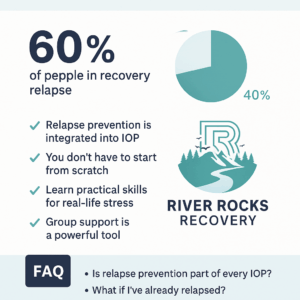Even if no one says it out loud, leaving treatment early can stir up a quiet kind of shame. You might wonder if the door’s still open—or if it’s too late to come back. The truth? You’re not the first to hit pause. And yes, relapse prevention is part of what IOP is built to help with.
At River Rocks Recovery’s Intensive Outpatient Program in Middletown, Ohio, you’ll find more than education. You’ll find space to re-enter at your own pace, with skills that meet you where you actually are.
Relapse prevention isn’t about never making a mistake again. It’s about learning to respond differently when things get hard—and practicing that in a space that understands real life doesn’t happen in a straight line.
Relapse Prevention Is Woven into Every Part of IOP
In our Intensive Outpatient Program, relapse prevention isn’t taught in a vacuum. It’s embedded in the structure of the program itself.
You’ll start by identifying your personal triggers—not just the obvious ones, but the emotional ones that sneak up on you. Maybe it’s isolation. Maybe it’s perfectionism. Maybe it’s the feeling that you’ve already failed, so why not give up?
Once those are named, you’ll begin to explore what actually helps in those moments. That might be grounding exercises, boundary work, or even building a list of safe distractions. And every skill you learn will be reinforced through real conversations, group check-ins, and individualized care.
You Don’t Have to Start from Scratch
One of the most common things we hear is: “I feel weird about coming back.”
You might worry you’ve missed too much. Or that you’ll be judged. Or that everyone else kept going and you didn’t.
But here’s the truth: people leave and come back all the time. Sometimes it’s because life got in the way. Sometimes it’s because the material hit too close to home. Sometimes it’s just hard to show up consistently when you’re still figuring out how to care about yourself again.
The point is, IOP is built with re-entry in mind. You don’t need to explain or apologize. Just let us know you’re ready—and we’ll help you get back into the rhythm.
Practical Skills That Apply to Real-Life Stress
It’s one thing to know you should call someone when you’re struggling. It’s another to practice making that call in a safe, no-pressure space.
IOP gives you time and support to:
- Build your relapse prevention plan in real time
- Try out different coping strategies and see what actually works
- Roleplay conversations that would normally make you freeze or shut down
- Recognize when a pattern is starting before it takes over
One client said it this way:
“It’s like I kept walking into the same wall. IOP helped me finally see the wall coming—so I could try going around it instead.”

Group Support Is a Powerful Part of Prevention
Even if you’re not a “group person,” being around others who are doing the work of staying sober—especially after setbacks—can be incredibly stabilizing.
Groups offer a mix of accountability and comfort. You’ll hear someone say something that sounds exactly like what you’ve been afraid to admit. And that connection—seeing yourself in someone else’s struggle and growth—is its own kind of relapse prevention.
You don’t have to lead with vulnerability. You just have to show up. The rest tends to unfold naturally.
You’ll Leave with a Plan That Doesn’t Assume Perfection
One of the biggest myths about relapse prevention is that it’s about avoiding mistakes at all costs. That kind of thinking can backfire. IOP helps you build a plan that includes:
- What to do if you feel yourself slipping
- Who you can reach out to (even if you haven’t talked in a while)
- What routines help you stay steady—and how to return to them if you fall off
- How to respond to shame without giving up
This is not a blueprint for perfect behavior. It’s a roadmap for what to do when you’re overwhelmed, numb, or tempted to isolate.
The Door Is Still Open—Even If You Walked Away
Ghosting treatment doesn’t mean you blew your chance.
Whether you left because of a life curveball, emotional overwhelm, or just needed space—you’re still welcome. The best relapse prevention plan is one that knows life gets messy and still says, “Come on in.”
We serve the Middletown area and nearby communities like Monroe and West Chester, Ohio, with flexible scheduling, virtual options, and support that adjusts as you grow.
Frequently Asked Questions About Relapse Prevention in IOP
Is relapse prevention part of every IOP?
Most quality Intensive Outpatient Programs, including River Rocks Recovery, include relapse prevention as a central focus. It’s not just one class—it’s an ongoing part of group discussions, individual planning, and skill development.
What if I’ve already relapsed—does that mean I failed the program?
Not at all. Relapse is common and never means you’ve failed. It just means something wasn’t working, and we can look at that together. Many clients re-engage with even more clarity after a relapse.
Will I have a personalized relapse prevention plan?
Yes. We’ll work with you to create a plan that includes your specific triggers, supports, and strategies. It’s collaborative—not a template.
Can I return to IOP if I stopped coming?
Absolutely. You won’t be penalized or judged. We’ll help you ease back in, and we’ll start from where you are now—not where you “should” be.
How do I know if IOP is enough—or if I need something more intensive?
We’ll help you assess that. If a higher level of care (like PHP or residential) seems more appropriate, we’ll discuss that with you transparently. But for many people, IOP is exactly the right step.
Ready to reconnect?
Call (888) 905-6281 or visit to learn more about our Intensive Outpatient Program services in Middletown, Ohio.




























